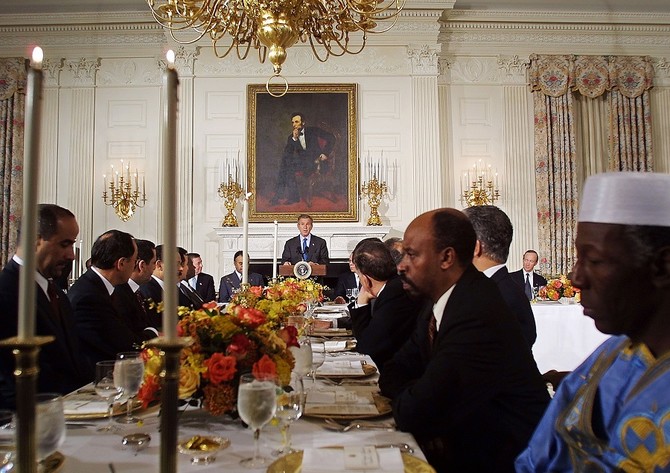LONDON: Will he or won’t he? His predecessors did. The first was as long ago as 1805. But as the 45th president of the United States, Donald Trump is nothing if not a mold-breaker.
Which is why, in 2017, he became the first president for more than 20 years not to host an iftar during Ramadan or for Eid Al-Fitr.
This year, however, rumor has it that there will be an iftar gathering at the White House “in early June,” although official confirmation has so far proved hard to come by.
Relations between the new US administration and Muslims were hardly friendly during Ramadan last year. On the campaign trail in 2015, leading up to the election in November 2016, the president called for a “total and complete shutdown” of Muslims entering the US.
Among the first acts of the new administration was an attempt to restrict entry into the US for citizens from seven predominantly Muslim countries, a policy that is still being challenged and counter-challenged in the courts.
In 2016, CNN reported that the new administration had called for surveillance on mosques, saying: “We have to maybe check, respectfully, the mosques. And we have to check other places. Because this is a problem that, if we don’t solve it, it’s going to eat our country alive, OK?”
Last year, Ramadan passed with barely a mention from the White House, apart from a statement, signed by Donald and Melania Trump and released at the end of the holy month, which said: “Muslims in the United States joined those around the world during the holy month of Ramadan to focus on acts of faith and charity. Now, as they commemorate Eid with family and friends, they carry on the tradition of helping neighbors and breaking bread with people from all walks of life.
“During this holiday, we are reminded of the importance of mercy, compassion, and goodwill. With Muslims around the world, the US renews our commitment to honor these values. Eid Mubarak.”
The statement did not appear on Trump’s social media feeds.
Thomas Jefferson, the third US president, was the first to hold an iftar when he delayed the start of a White House dinner on Dec. 9, 1805 until after sunset to accommodate his guest, Sidi Soliman Mellimelli, the envoy from Tunis.
Hillary Clinton revived the practice in 1996, when she was First Lady, hosting a reception to mark Eid Al-Fitr which was attended by about 150 diplomats, legislators and Muslim community leaders. From 1999, the iftar became a fixture on the White House calendar, continued by both George W. Bush and Barack Obama.
President Bush even held one after the Sept. 11 attacks in 2001, insisting that it was more important than ever to show that the White House and the US were inclusive.
“We were at war with terrorist organizations, not with Islam itself,” said James Norton, Bush’s deputy assistant secretary of homeland security. “President Bush went out of his way to wrap his arms around the Muslim community.”
Even the Israelis have celebrated iftar. In 2011, the Israeli ambassador to the US, Michael Oren, hosted an iftar dinner for the first time at his official residence in Washington. Guests broke the fast with dates, apricot juice and soup, and were then served a full halal meal after prayers.
So it is hardly surprising that Trump was widely condemned for not opening up his White House during Ramadan last year. Haroon Moghul, a fellow in Jewish-Muslim relations at the Shalom Hartman Institute, called the decision “the beginning of his hatred of us, rhetoric unfolding into policy.”
Reuters reported that the fault lay with Rex Tillerson, then secretary of state, who refused to host a reception, rejecting a recommendation by the office of religion and global affairs in his own State Department. When asked why there was no White House iftar, press secretary Sean Spicer — rarely short of an answer — simply replied: “I don’t know.”
Others had an answer, though. “The White House has abandoned iftar since the Trump administration is not interested,” said Jalil Khan, president of PAKPAC, a Pakistani-American organization which hosted an iftar on May 23 on Capitol Hill for members of Congress.
“Our political action committee took the lead and organized iftar for the second year in a row, and we’ve been stressing the importance of political activism by Pakistani Muslims living in the US.”
This year, however, there appears to be a change of heart. The first signs were the unmistakably warm — some would say conciliatory — greeting from the president at the beginning of Ramadan. It began, rather poetically: “With the rising of tonight’s moon, I send my greetings and best wishes to all Muslims” and referred to “the richness Muslims add to the religious tapestry of American life.”
On Saturday, Trump wished “all Muslims a joyful Ramadan” on Twitter. He recalled his visit to Saudi Arabia and promised that “America will always stand with our partners against terrorism and the ideology that fuels it. During this month of Ramadan let us be resolved to spare no measure so that we may ensure that future generations will be free of this scourge and able to worship and commune in peace.”

Former US President George W. Bush speaks at a Ramadan dinner. File photo
Though the official word from the White House is “no update,” Ray Mahmood, a prominent developer with long involvement in inter-faith diplomacy in Washington, said he had heard there was to be an iftar.
“I think they are very important to the Muslim community. At least they feel the president at the White House is doing this,” he said. The favored date appears to be June 6.
Meanwhile, semi-official events have come and gone. Islamic Relief USA hosted a “grand iftar” on
May 19 and the United Nations Relief and Works Agency hosted an iftar on May 25 for Gaza. The American-Arab Anti-discrimination Committee is holding an “iftar banquet” on
May 31 in Alexandria, outside Washington DC. There are fund-raising iftars, corporate iftars and even an “open mic” iftar by the DC Muslim Writers Collective.
The UAE embassy also hosted an interfaith iftar last Thursday.
But an after-sunset event at the White House will top them all.

























